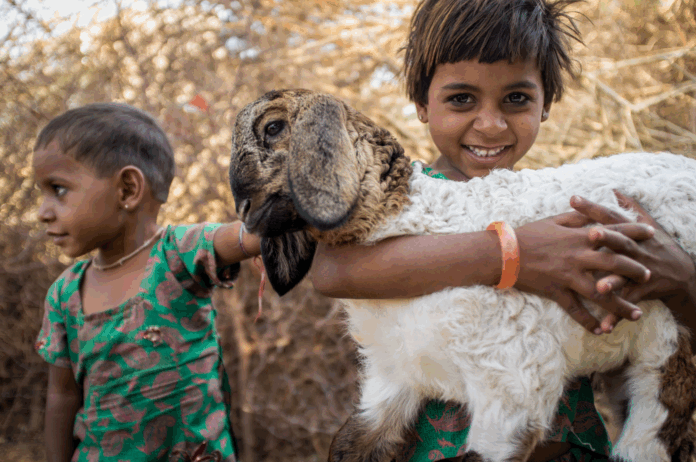In a busy neighbourhood in Delhi, a newborn sleeps peacefully between her mother and grandmother on a shared bed. She is fed whenever she cries and soothed by touch and presence rather than clocks or schedules. Across the world, in a modern apartment in London, another baby sleeps in a sleek white cot. Parents follow a strict feeding timetable, track sleep patterns on apps, and check milestones recommended by doctors and online guides. Meanwhile, in a rural Kenyan village, a mother ties her baby to her back while preparing a meal. The infant watches daily life, comforted by closeness to the mother, learning about the world through observation rather than formal instruction.
These three babies are all growing, learning, and thriving — but their routines and early experiences are very different. For decades, developmental psychology has assumed that childhood is the same way everywhere, guided by fixed patterns like sleeping alone, following strict schedules, or learning certain skills by a certain age. Any difference from these ‘standards’ is often seen as a delay or problem.
The examples of infant care show how developmental psychology has created one-size-fits-all expectations. The forthcoming book Reframing Developmental Psychology: Perspectives from the Global South makes clear that the focus ought to be much wider.
Growth and learning are shaped by culturally relevant practices, family life, community, and history at every stage. Childhood, then, cannot be reduced to a single path — it is a living, culturally shaped experience.
For much of the twentieth century, psychologists believed all children develop the same way. Theories about their development and milestones about what happens when, came mostly from Western, educated, industrialized, rich, and democratic (WEIRD) populations. These “standards” were applied everywhere, often ignoring whether they fit culturally relevant practices.
The myth of the ‘universal child’
A child in a rural Indian village who sleeps with family members, is fed on demand, and learns by watching adults might be judged ‘behind’ by Western measures. In Latin America, children helping with household work or caring for siblings may be considered ‘burdened’ or ‘at risk.’ Yet in their own communities, these children are learning valuable skills, understanding relationships, and growing in ways that matter.
The problem is assuming development follows a single path. Traditional psychology often treats differences as deficits, ignoring how culturally relevant factors — family, social relationships, and history — shape growth. These assumptions become idealized as the goals for families and communities everywhere as well as for global programmes and interventions.
The book challenges the idea of the universal child, showing that children grow in many ways. Understanding these differences is essential to seeing development as it really happens.
When difference becomes deficit
Modern society — especially through science, technology, and social media — pushes the idea that constant progress and improvement are necessary. Parents and professionals turn to online tools to measure children against global standards. But this obsession with “milestones” often leads to labelling natural differences as deficiencies.
Too often, cultural differences are mistaken for weaknesses. A baby who sleeps with her mother may be called ‘over-dependent.’ A child who helps with family chores may be labelled ‘prematurely burdened.’ Standardized tests, based on Western norms, miss the ways children actually learn in their communities.
Reframing Developmental Psychology emphasizes that growth is relational and culturally relevant. Children develop through family routines, social interactions, and community life. Judging them by a single standard ignores the richness of human experience.
This approach also exposes a colonial legacy in psychology: Western ideas and methods have been applied globally, often treating local knowledge as less valid. The book argues that difference is not deficit — cultural practices are essential to understanding human growth.
Peripheral lives, central meanings — Why we need new ways of knowing
Many lives have been ignored in research because they are considered ‘peripheral.’ Rural, indigenous, and marginalized communities are often seen only as data points. Yet these spaces show development in action: children learning through observation, shared caregiving, and community participation.
This calls for a shift in how we understand knowledge. Psychology cannot assume what works in one culture applies everywhere. Knowledge is shaped by culturally relevant practices, history, and relationships.
Practices once considered “peripheral” — co-sleeping, shared caregiving, learning through participation — are meaningful ways children grow and learn. This knowledge is valuable not only for the community it is prevalent in, but indigenous knowledge should be recognised and valued to prevent cultural erosion and knowledge decline.
Changing the way we see knowledge also means rethinking research methods. Standardized, number-based approaches cannot capture these everyday, meaningful experiences. Qualitative research, storytelling, and working alongside local communities give a clearer picture. It also challenges authority: local scholars and communities must help shape questions, methods, and interpretations.
By putting ‘peripheral’ lives at the centre, the book promotes a developmental psychology that is flexible, culturally relevant, and fair. It shows that cultural diversity is a strength, not a problem.
Contextualizing development: Why culture matters
Growth and change don’t stop after childhood. Yet traditional theories often treat later life as predictable or secondary. Reframing Developmental Psychology emphasizes that adulthood and old age, like childhood, are shaped by culturally relevant practices, family, and history.
In many Global South communities, adulthood is about relationships and responsibilities, not just career or independence. Young adults may live with extended families, contributing economically and socially. Older adults often remain central as caregivers, advisors, and keepers of culture, challenging Western ideas of aging as decline.
Rigid age-and-stage models also miss variability in adolescence and adulthood. Teenagers may take on family responsibilities that build maturity and resilience. Elders may retain knowledge, social skills, and active roles far longer than Western norms expect.
The book argues that development should be understood across the whole lifespan — a dynamic, relational process shaped by culturally relevant practices. This approach helps parents, educators, and researchers support growth at all ages.
New frontiers — Towards a more human psychology
Finally, the book explores how developmental psychology can become more inclusive and human centred. Traditional research emphasizes objectivity and measurement, often missing the cultural and relational aspects of life.
The authors call for multiple ways of knowing: combining observations, stories, and collaboration with communities. Local scholars and participants should co-create research rather than being studied from the outside. Technology and partnerships across disciplines make this possible, giving richer, more inclusive insights.
Ethics are central. Research must consider historical inequalities, power imbalances, and the real impact on families and communities. Authenticity and accurate representation are essential in human research. Development is not just about milestones — it is about relationships, cultural meaning, and participation in community life.Reframing Developmental Psychology envisions a field that is pluralistic, fair, and culturally relevant, where the experiences of the Global South are central, not peripheral. It invites parents, educators, students, and readers to question assumptions, embrace diversity, and engage with a science of human growth that honours the complexity of life everywhere.


